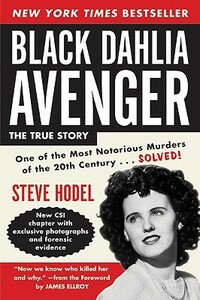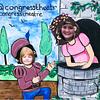Take a photo of a barcode or cover
I read this in the Kindle version over the weekend and went into it, based on what I had heard, expecting it to be poorly researched and essentially a crusade against an absent father. My assumptions were quickly blown out of the water.
Steve Hodel was a highly capable LAPD detective, and it shows. Though I might not always agree with the conclusions he draws from the evidence, the legwork itself is very impressive. I've read most of the Dahlia related books out there, and it didn't feel as though Hodel was cherry picking evidence to anywhere near the extent of many of them. The book also encouraged the reader at multiple points to visit the author's website for the most up to date info on the investigation, and I liked the fact that there Hodel took being proved wrong on the chin (eg. one of the two photographs which sparked his suspicions being categorically proven not to be of Beth Short) and, for want of a better phrase, didn't come off as a close minded crank.
One thing to note is the large amount of text dedicated to Hodel's family life. It serves to paint a picture of the kind of man his father was, but is arguably given more focus than necessary and might be off putting to someone who just wants to know about the Dahlia case. Personally I found the background information fascinating - the family, and their connections with the 'great and good', would make a must read book on its own!
I think a lot of this book's bad reputation stems from Hodel's inclination to state conjecture as fact. Much of this, in my opinion, comes from Hodel's style of writing - which is more gripping than a cautious, more blatantly objective writer might manage - but it can grate at times, particularly for those familiar with the case.
Still, Hodel's aim was to solve the Dahlia case. While not totally convinced on the how and the why, I came away feeling that George Hodel is by far the strongest suspect, even tentatively happy to say 'he done it'. To my mind, that's value for money!
Steve Hodel was a highly capable LAPD detective, and it shows. Though I might not always agree with the conclusions he draws from the evidence, the legwork itself is very impressive. I've read most of the Dahlia related books out there, and it didn't feel as though Hodel was cherry picking evidence to anywhere near the extent of many of them. The book also encouraged the reader at multiple points to visit the author's website for the most up to date info on the investigation, and I liked the fact that there Hodel took being proved wrong on the chin (eg. one of the two photographs which sparked his suspicions being categorically proven not to be of Beth Short) and, for want of a better phrase, didn't come off as a close minded crank.
One thing to note is the large amount of text dedicated to Hodel's family life. It serves to paint a picture of the kind of man his father was, but is arguably given more focus than necessary and might be off putting to someone who just wants to know about the Dahlia case. Personally I found the background information fascinating - the family, and their connections with the 'great and good', would make a must read book on its own!
I think a lot of this book's bad reputation stems from Hodel's inclination to state conjecture as fact. Much of this, in my opinion, comes from Hodel's style of writing - which is more gripping than a cautious, more blatantly objective writer might manage - but it can grate at times, particularly for those familiar with the case.
Still, Hodel's aim was to solve the Dahlia case. While not totally convinced on the how and the why, I came away feeling that George Hodel is by far the strongest suspect, even tentatively happy to say 'he done it'. To my mind, that's value for money!
dark
informative
fast-paced

